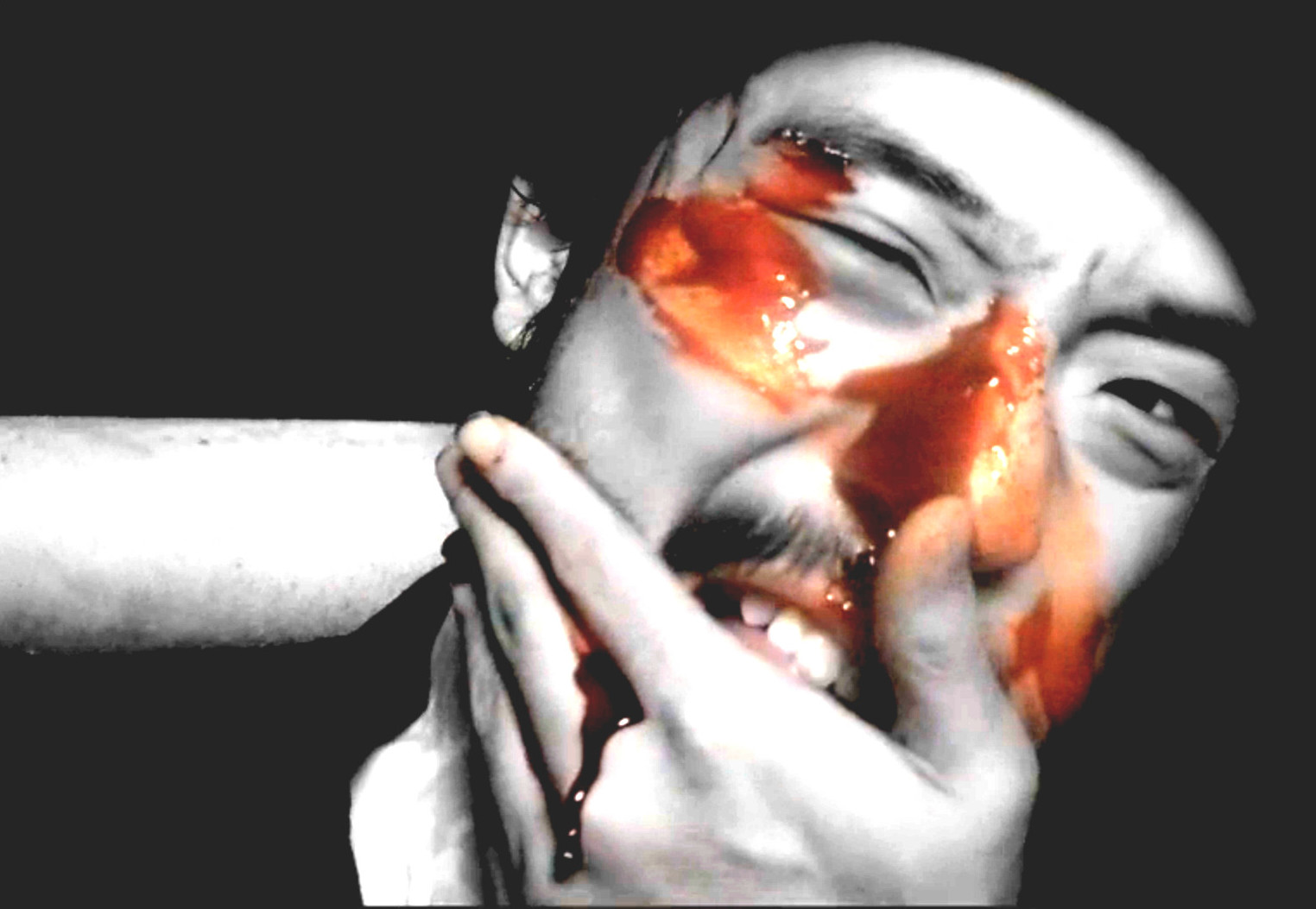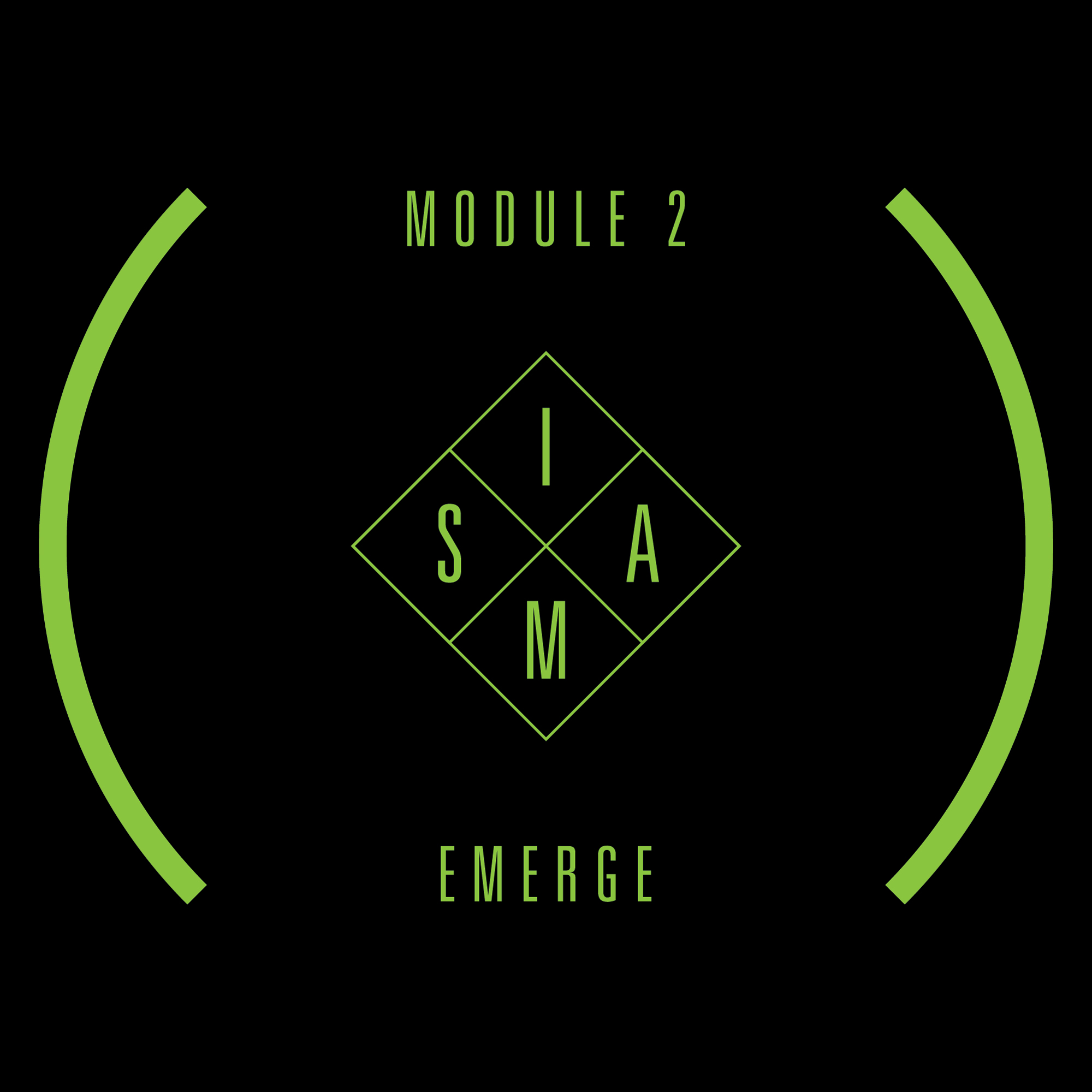Interview: Kiwese
By Josh, 2016年 5月 3日
In my constant search for pangbianr-like material coming from other parts of China, at some point last year I stumbled upon Kiwese, a multimedia blog single-handedly run by Wellington, NZ transplant Kristen Ng. On the site, Kristen runs deep coverage of the Chengdu underground, highlighting new bands, venues, promoters, and other DIY stuff like localized crowdfunding apps and air raid shelter raves. Here’s a recent article about the twice-demolished but still extant Morning Bar in Chengdu, one of her usual haunts. And here’s a video interview she did with fellow Kiwis Shocking Pinks when they passed through Beijing last Fall.
In 2015, Kristen organized a China tour for New Zealand band Orchestra of Spheres, and plans to expand Kiwese into a “cross-country touring platform”, sending Chinese bands to her homeland. She’s also involved in electronic music label atmen, a new film screening and music venue called NU Space, and probably a half-dozen other ventures I’m not remembering.
Below, Kristen tells us more about herself and her projects, and recommends some new bands to check out from Chengdu’s hotpot-boiling underground music scene. Enjoy:
***
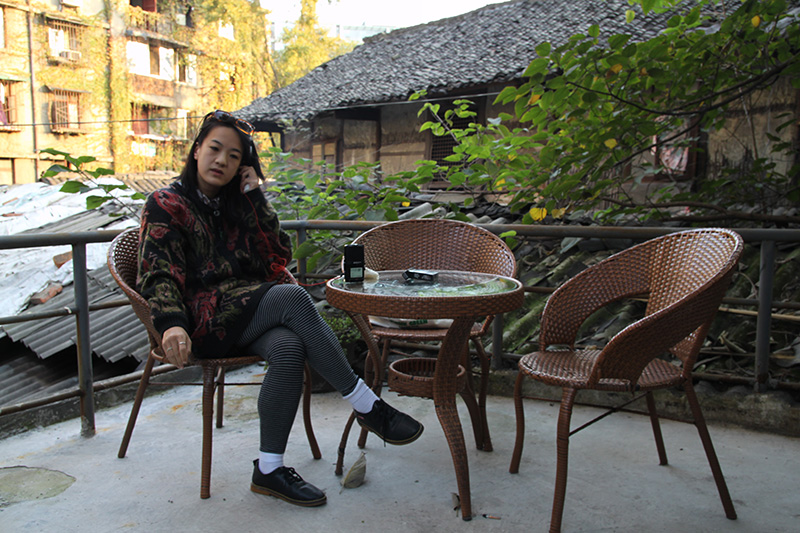
pangbianr: First a little self intro… Who are you? Where are you? What do you do?
Kristen Ng: My name is Kristen Ng. I’m originally from Wellington, New Zealand and have been living in Chengdu for almost two years. I’m a writer, guitarist, DIY documentarian, promoter, occasional tour manager, booking agent, music fan… basically I’m that chick at the front with a beer, haha.
I’ve run a blog called Kiwese since 2013, which features musicians, artists and alternative perspectives from China and New Zealand, as well as musings on cultural identity and race. Last year I toured Orchestra of Spheres around China under the Kiwese banner.
This year I’ve been super stoked to join several music ventures in Chengdu: NU Space, a brand new venue for gigs and films in town; Morning Bar 早上好, our local watering hole that is going strong after two demolitions; and the electronic label atmen, where I play guitar and create chaos with my friends Xiang and Su.
pbr: How long have you been living in China? Why did you come in the first place? Why have you stayed?
KN: I’ve been living in China for almost three years. Like most people, my first introduction was as a language student in the eternal bog of stench, also known as the BLCU dorms. China has always called to me because of my roots, though China today and the China my grandparents knew are completely different beasts. This place is full of surprises. People dance in the street. Wearing pyjamas out of the house is normal. It’s grimy and full on. It’s traffic and screens and noise; a rabble of excess, extremities, people. It’s mountains and lakes, skyscrapers and wooden shacks. It’s teeth chattering, goosebump-inducing cold; it’s face melting humidity and sweat. Which is why I love it, it challenges and confronts and rewards, it drives me up the wall at times, and it makes me smile and grow.
Oh and there’s super cute dogs and babies everywhere, which is always a bonus
pbr: Your blog Kiwese — which kicks the shit out of pangbianr aesthetically, I must say — covers different corners of the Chengdu underground music scene. What’s interesting, unique, or different about the Chengdu scene, as compared to other cities in China?
KN: Hahaha, Kiwese is actually run off a default WordPress template… every time I stumble across a site with the same template I cry a little inside.
The music scene in Chengdu is really diverse and tight knit, there’s a real sense of community between labels, venues and creatives. At Chunyou last weekend, an annual music festival run by Morning Bar 早上好, there was folk, post-punk, minyao, reggae, lo-fi pop and hip hop all on the same bill, while a hostel set up a camping zone, an art collective built an installation and people from the clubs ran the electronic stage. People really pool their energy together, it’s an awesome vibe.
There is also a burgeoning club scene in Chengdu. There’s the Poly Centre 保利中心, this 21-story high building full of bars and clubs that is an office building during the day and a tower of electronic beats and debauchery at night. I’ve never seen anything else like it. Electronic music is thriving with labels, DJs, clubs, promoters and producers, many of whom have been passionately building the scene for years.
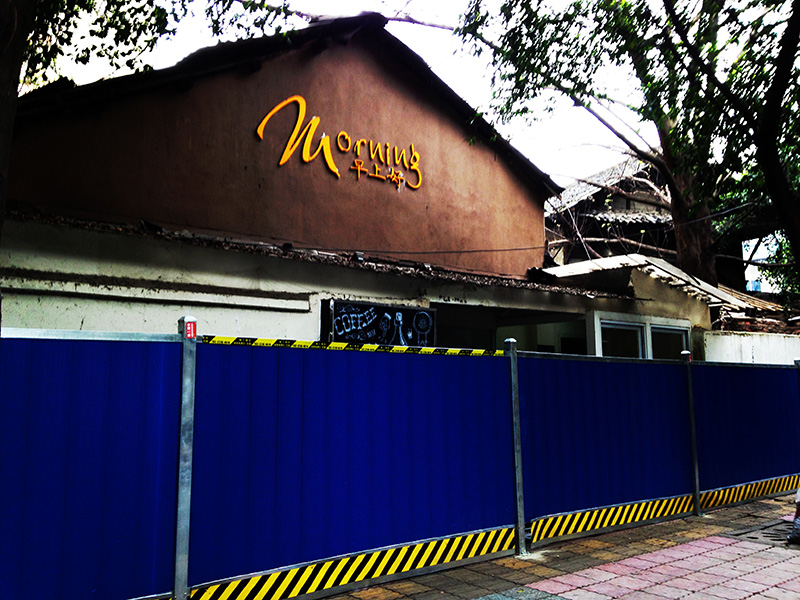
Chengdu’s Morning Bar, pre-demolition
KN: Jam nights are popular at places like Machu Pichu, Submarine Bar, Steam Hostel, Jah Bar and Gu Bar. These days there are far more DJ shows than live gigs, but with the opening of the new Morning House 早上好 and NU Space, we hope to reach an equilibrium.
Chengdu’s relationship with Chongqing is also pretty cool. Acts that have the time to come out this way are rewarded with back to back shows and hotpot in both cities! People often flit back and forth on the bullet train, so there’s a bit of cross pollination between the two cities.
pbr: The more general mission statement of Kiwese is to track cultural connections between your home country, New Zealand, and China, where you have family roots. What are some historical connections between NZ and China?
KN: The kiwifruit was originally from China! That’s why I chose it as my logo. Fresh.
pbr: You came through Beijing a few times last year to check out tours by fellow Kiwis Shocking Pinks and Orchestra of Spheres. What was your impression of Beijing? Any bands or venues stick out to you?
KN: Yeah, I used to live in Beijing and always enjoy going back! Beijing has a lot more art galleries, coffee shops and international food than Chengdu. I find Beijing a little less personal than other cities, it’s this nomadic hub of people from all over the world all rushing about. There’s also a lot more heat from the authorities in Beijing – I remember arriving at the opening of Design Week in the hutongs last September when it was surrounded by cops and shut down..
The creative scene in Beijing is unparalleled in China – there are so many gigs, festivals, exhibitions and film screenings as well as a solid network of blogs, magazines and journalists. Being able to go out and see a band on any night of the week is something I miss about Beijing.
For bands, Lonely Leary were a stand out for me, also Birdstriking and Forests. For venues, School, Yugong Yishan, Temple and Dada. I hope to visit fruityspace next time, and one of these experimental underpass shows.
youtube version here
pbr: You made a tour documentary for Orchestra of Spheres along with visiting New Zealand artist Erica Sklenars. What were some absurdities or highlights from the tour that you captured on video? What can we look forward to seeing after clicking play on the Beijing episode above?
KN: Hahaha – Orchestra of Spheres and Lady Lazer Light are a crew who really go in for the weird stuff. For me, getting to see my favourite band play six times in like a week is a life highlight in itself!
We held an awesome little techno party at a BBQ shack in Feijiacun, where the owners had decked the place out with Christmas tinsel and Chinese flags. In Chongqing, the Spheres performed a hilarious ‘hip-hop’ set with freestyle lyrics about multinational milk corporations, vaginas and snack foods.
This was the first Kiwese tour of China, next year I am hoping to bring fellow Wellington noise freaks The All Seeing Hand and eventually take a Chinese band to New Zealand, turning Kiwese into a cross-country touring platform.
pbr: You recently joined atmen, an electronic music label doing warehouse raves in Chengdu. Who else is involved? What kind of music or which artists do you feature? What other alternative venues/sites do you have planned? Will you release music as well?
KN: Yeah, atmen was started last year by Xiang and Su, two DJs that are well-known on the Chengdu club circuit and also really good mates of mine. They’ve both spent a lot of time in Germany and draw a lot of inspiration from Berlin techno, minimalism and clubs.
Last year they held their first two events, Aus-atmen and Ein-atmen, in an empty swimming pool and an underground air raid shelter. I really dig atmen’s understated, conceptual approach. The DJs that play are mostly from our local circle, friends that enjoy a similar style of techno to us. Recently I’ve started playing live guitar effects with Xiang and Su, and we’re also beginning to produce our own music to release at a later date.
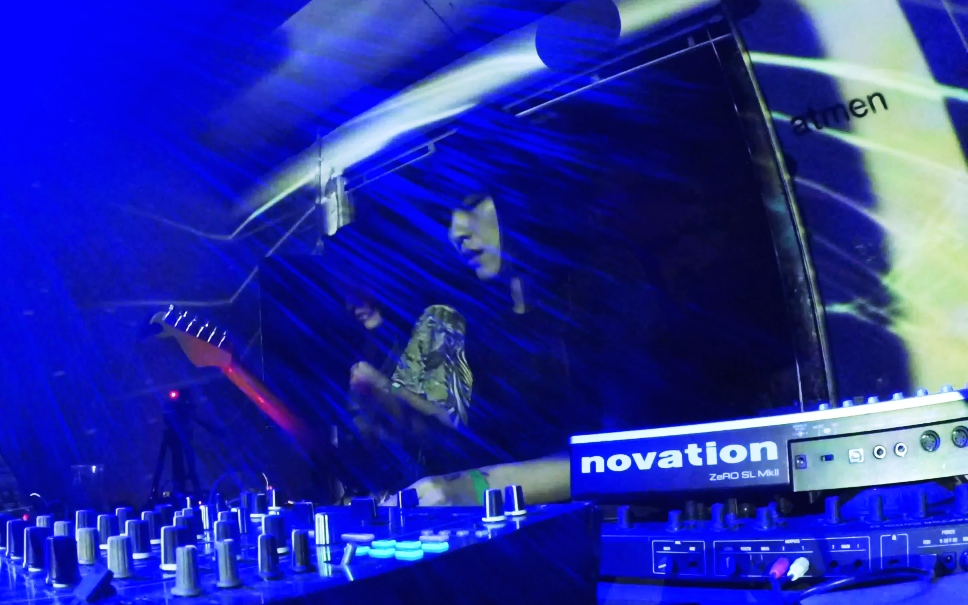
KN: Next month we will host Aus-atmen 2016, an electronic music festival out in the Chengdu countryside, with ten local and international DJs on the main stage. Predominately techno. We’re expanding on last year to include a second stage, craft market, jam teepee, art installations, tattooing and extreme croquet. There’s also a swimming pool! Camping festivals are few and far between in China, so we are hoping to see people from out of Chengdu too!
You can read more and buy pre-sales on Zaomengshe.
pbr: What is Zaomengshe? I see it used for most Chengdu events these days.
KN: Zaomengshe is a crowdfunding and ticketing platform run by my friend Lydia and my flatmate Mat. It started in Chengdu and has since spread to Chongqing – recently there was a campaign in Xi’an that went up on the site! It has two apps: one to view campaigns and see how many other people have bought tickets, one to scan tickets at the door. The site is bilingual and supports WeChat pay, Alipay and Paypal. I’ve used it as both a promoter and a punter, it is an independent platform which aims to provide its users with music connectivity, convenience and opportunity. Most of the venues and clubs in Chengdu will upload events on Zaomengshe!
pbr: Beijing’s been all abuzz about the fresh Chengdu rock’n’roll talent lately. Are there any local bands besides Stolen, Hiperson, The Hormones, or old hands Proximity Butterfly that you can recommend?
KN: Stolen, Hiperson and The Hormones are Chengdu’s holy trinity of young talent.
Noise Temple – an electronic audio-visual collective made up of Huang Jin 黄金, who moved to Beijing to drum for Re-tros, and VJ Mian, an incredible projectionist and videographer, and recently Xiang, who has joined on synths.
Gajin are a minyao folk band from Lanzhou who are always a good time live. Their album 《咋咋咋了!?》 is really good too, they crowdfunded it on Zaomengshe and released it last year!
Sinkers are a young indie-rock three piece who I’ve seen once and would like to see again.
Really looking forward to seeing more local bands emerge this year.
pbr: Anything else you’re working on and want to plug?
During the Spheres tour, Erica Sklenars and I shot a super low-budget music video with South Acid MiMi Dance Team in Kunming, which was a total riot! More to come on that soon, but what I will say is: yogurt.
***
Follow Kristen’s coverage of Chengdu’s art & music scenes, plus other topics, at Kiwese.co.nz



